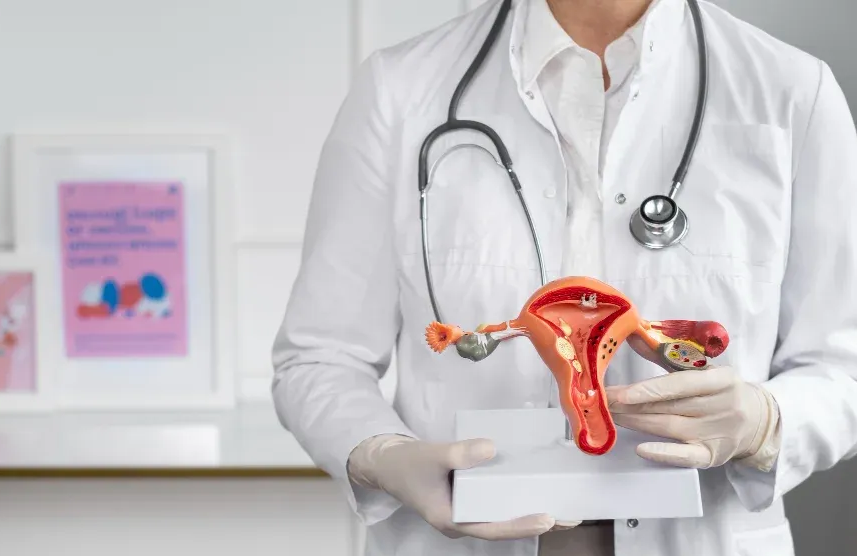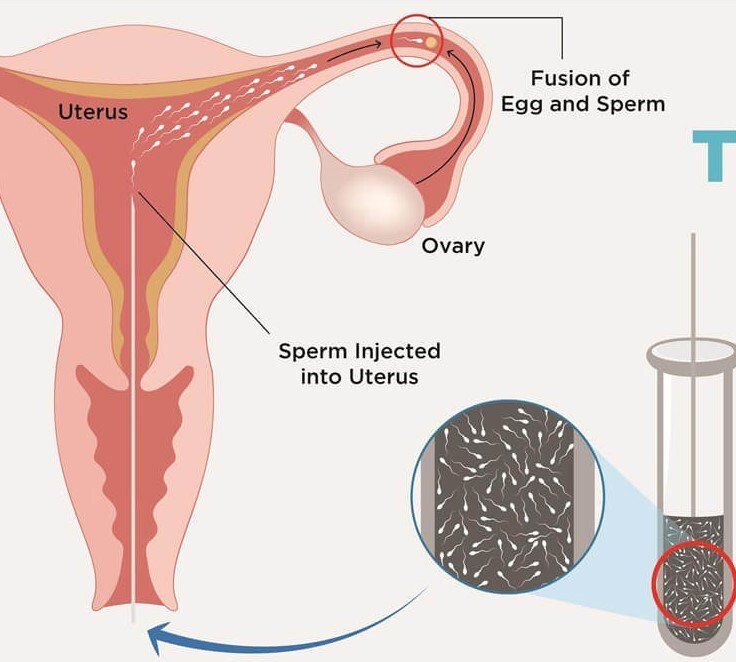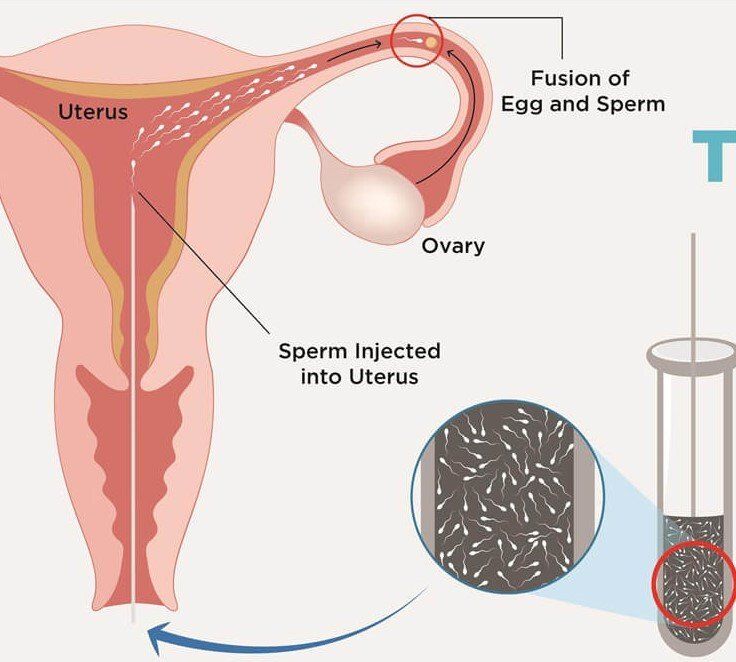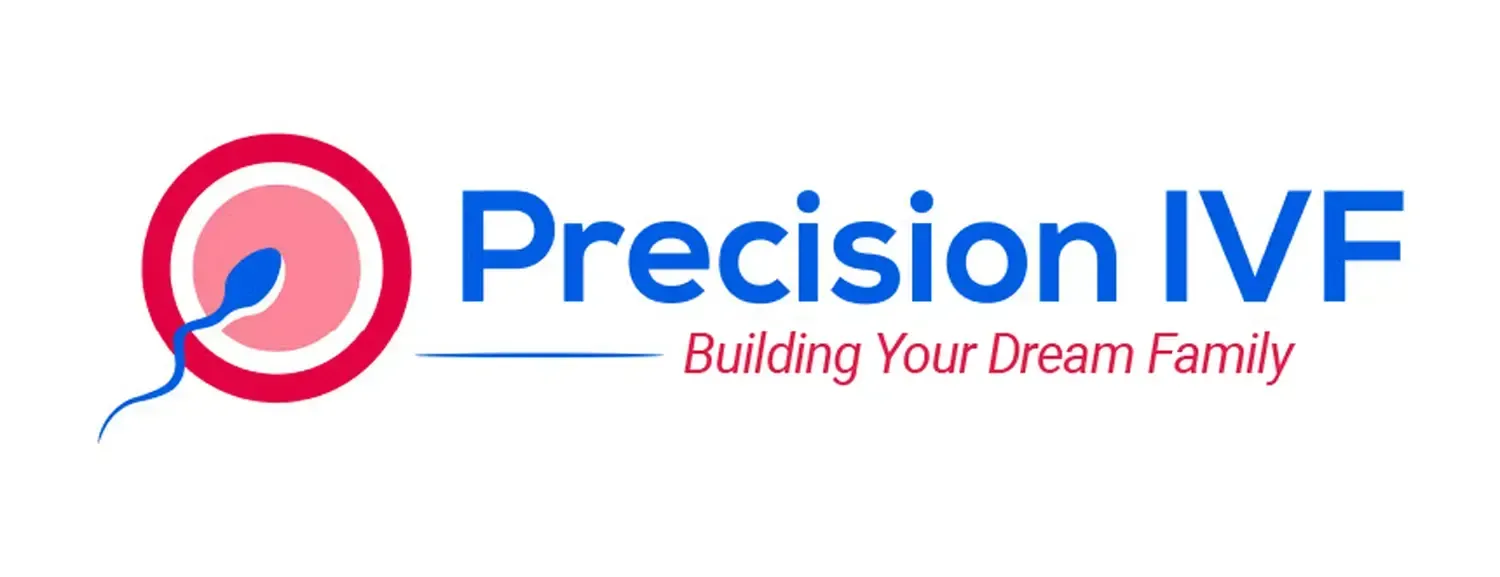Intrauterine Insemination (IUI) Treatment at Precision IVF
Intrauterine Insemination (IUI) is one of the most common types of fertility treatments. IUI has helped many couples struggling with infertility to achieve pregnancy. This procedure uses a small catheter to put “washed and concentrated ” sperm directly into the woman’s uterus close to the fallopian tubes during the time of ovulation. For selected patients, IUI can be an effective and affordable alternative to other fertility treatment options.
What is IUI?
Intrauterine Insemination (IUI) is one of the most common fertility treatments worldwide. It involves placing “washed and concentrated” sperm directly into the uterus using a thin catheter. By bypassing the cervix and positioning sperm closer to the fallopian tubes, IUI treatment improves the chances of fertilization during the fertile window.
Patients often appreciate that the IUI procedure is minimally invasive, quick, and less expensive compared to other fertility options like IVF.


Is IUI Right for You?
Many patients are pleasantly surprised to find out that all they need is Intrauterine Insemination (IUI) treatment, which can be an effective yet more affordable option for them. IUI is less complex than other forms of artificial insemination and it is fairly painless. At Precision IVF we focus on assessing each patient's specific situation to determine your personal path to parenthood. We will work with you to help you understand the reasons for infertility in your case and together we will determine whether IUI is the right option for you.
Reasons for IUI:
- Patients who have been diagnosed with:
- Mild male factor infertility
- Ovulatory or cervical issues
- Unexplained infertility
- Couples using donor sperm
- Same-sex female couples or single women
Our IUI Process at Precision IVF
Dr. Arya and the team at Precision IVF are highly skilled in performing IUI procedures. The process is quick (approximately 15–20 minutes) and conducted in our comfortable outpatient clinic. Below are the main steps in your treatment journey:
Medications for IUI
You may receive one of the following medications in the IUI treatment cycle, depending on your diagnosis:
Clomiphene citrate (Clomid) and letrozole (Femara) are oral medications commonly used for the treatment of women with ovulation disorders as reflected by infrequent or irregular menstrual cycles. Clomid or Femara pills are taken orally for 5 to 7 days, typically starting on day 3 of a woman’s menstrual cycle to induce ovulation.
Clomid works at the level of the brain and pituitary gland and facilitates the release of follicle-stimulating hormones (FSH). FSH stimulates the ovaries to grow a follicle (or follicles) and the ovarian hormone estradiol (E2) goes up. This is followed by an increase in the luteinizing hormone (LH), which is produced by the pituitary gland. LH helps in final maturation of the follicle and egg in it, further increasing E2 and progesterone (P4). The initial prescribed dosage of Femara is 2.5 to 5 mg and for Clomid it is 50 to 100 mg (one or two tablets) daily at bedtime, or as prescribed by your physician.
Letrozole works by inhibiting the production of estrogen. When estrogen is low, the pituitary gland gets a message that it needs to produce FSH, which stimulates the ovary to grow a follicle (which has an egg in it). Some women on Clomid or Femara may grow more than one follicle because they produce more FSH while on letrozole than a woman who produces FSH when ovulating naturally.
Monitoring Ovulation
For IUI to be effective it must be performed before or within 24 hours of ovulation or the egg is no longer fertilizable. The life of an egg is much shorter than the life of the sperm, so there is only a short window of time in which an egg and a sperm can interact and create an embryo. Hence, it is better for the sperm to be in the uterus early rather than late.
In order to appropriately time for this treatment, we carefully monitor your ovulation using a midcycle ultrasound and bloodwork. On an ultrasound we measure the thickness of the uterine lining and assess the ovaries for the number and size of follicles within them. With blood work, we test E2 and P4 (estrogen and progesterone). Increased levels of estrogen indicate follicular development. Once the follicle is mature based on the monitoring, we may use an hCG injection (“trigger shot”) to help in ovulation and timing of the IUI procedure. We will schedule the procedure 1-2 days after ovulation begins.
You will receive personalized treatment instructions to maintain good communication of the plan and timeline. We also give you 24/7 access to our clinical team to assist you through the entire process.
Sperm Preparation for IUI
A semen sample (either from a woman’s partner or a sperm donor) will be needed, usually provided by the male after masturbation and prepared in the lab for IUI. Sperm preparation involves placing the sperm sample in a test tube and then a centrifuge, which results in the sperm collecting in a “pellet” at the bottom of the test tube. The seminal fluid is removed and the sperm pellet is suspended in sperm media. The IUI specimen preparation is individualized based on the various parameters like sperm concentration.
IUI Procedure
This quick (20 minute) procedure involves inserting a thin tube into the uterus to place the concentrated sperm sample. The goal is to get a high number of sperm directly into the uterus, increasing the chances of sperm finding the egg in the fallopian tube, where fertilization takes place. When successful, the sperm fertilizes a woman’s egg and creates an embryo and the embryo travels down into the uterus to implant and grow. After the procedure the patient will lie down for a few minutes before returning to normal daily activities. Patients may experience light spotting for 1-2 days following IUI.
After your IUI, you may be directed to take daily supplemental progesterone usually in the form of a capsule inserted into your vagina twice a day. This is to support the endometrial lining of the uterus and implantation of the embryo.
Results & Follow Up
Two weeks after the procedure the patient will do an at-home pregnancy test to find out if the procedure was successful. When it is positive, we will plan a blood draw to check the hCG level to confirm pregnancy and subsequently will perform an ultrasound at approximately 6 weeks of pregnancy. For patients who do not become pregnant , we will schedule a follow-up consultation with you to review your IUI protocols and determine the next steps. Many patients try IUI more than once before considering alternative treatment options.

IUI Success Rate
Many patients ask about the chances of pregnancy with IUI. The IUI success rate depends on several factors, including age, underlying fertility issues, use of fertility medications, and the quality of sperm.
List of Services
-
List Item 1
1. For women under 35, success rates may range from 10–20% per cycle.
-
List Item 2
2. Success rates are lower for women over 40, but some still benefit from IUI before moving to IVF.
-
List Item 3
3. Using fertility medications along with IUI often increases success rates compared to natural cycles.
At Precision IVF, we use advanced monitoring and lab techniques to give you the best possible chance for a successful pregnancy.
IUI Pregnancy: What to Expect
If the IUI procedure is successful, fertilization occurs in the fallopian tube and the embryo travels to the uterus for implantation. Early signs of IUI pregnancy may include missed periods, breast tenderness, fatigue, or mild cramping.
Our team provides guidance and emotional support during the two-week waiting period, which many patients find to be the hardest part. Remember, every body responds differently, so symptoms may vary.

When to Take a Pregnancy Test After IUI?
One of the most common questions is: “When should I take a pregnancy test after IUI?”
Generally, we recommend waiting two weeks after the IUI procedure before testing. Testing too early may lead to false negatives, since it takes time for the embryo to implant and produce detectable levels of hCG (the pregnancy hormone).
At Precision IVF:

IUI Treatment At Precision IVF
With us IUI treatment is not just medical process, we prioritize, compassionate care. Our team is available for guidance and we provide resources to help patients manage stress and anxiety during the journey.
We encourage open conversations about your hopes, fears and expectations. Many patients find comfort in connecting with others who are going through the same experience.
Why Choose Precision IVF for IUI Treatment?
Choosing where to begin your fertility journey is an important decision. Here’s why patients trust Precision IVF:
List of Services
-
List Item 1
1. Experienced fertility specialists led by Dr. Arya.
-
List Item 2
2. Personalized care plans tailored to your specific needs.
-
List Item 3
3. Advanced lab technology for higher IUI success rates.
-
4. Affordable IUI cost options with transparent pricing.
-
5. Supportive team available throughout your journey.
Our mission is to provide not just treatment but hope, compassion and expert guidance every step of the way.

Book Your Appointment Today
If you’ve been struggling to conceive, IUI treatment may be the simple and effective option you’ve been waiting for. At Precision IVF, we combine medical expertise with compassionate care to help you achieve your dream of parenthood.
Call us today or schedule a consultation online to discuss your options for IUI treatment. Together, we’ll create a personalized plan that gives you the best chance for success.
Frequently Asked Questions
1. How long does it take to get pregnant with IUI?
Many patients wonder how quickly they can conceive with IUI treatment. Some women achieve pregnancy on their first cycle, while others may need multiple attempts. On average, most couples try 3–6 cycles before either achieving success or moving to other options like IVF.
2. Is IUI better than IVF?
IUI and IVF are both fertility treatments but serve different needs. IUI treatment is less invasive, more affordable, and often the first option for couples with mild infertility issues. IVF, on the other hand, is more advanced and usually recommended when IUI has not been successful or when infertility factors are more complex.
3. Is it painful to do IUI?
The IUI procedure is generally not painful. Patients may feel slight cramping or mild discomfort during the insertion of the catheter, but the process takes only about 15–20 minutes and recovery is immediate. Most people resume normal activities right after.
4. Are IUI babies normal?
Yes, babies born from IUI treatment are just as healthy and normal as babies conceived naturally. The procedure simply assists sperm in reaching the egg; once fertilization occurs, pregnancy progresses just like any other.
5. How expensive is IUI?
The IUI cost is much lower compared to IVF, making it one of the most affordable fertility treatments. The exact price can vary depending on whether fertility medications are required, but at Precision IVF, we provide transparent pricing and financial guidance before starting treatment.
The best way to determine whether IUI is a good choice for you is to schedule a consultation with Dr. Arya to help you understand your treatment options!








